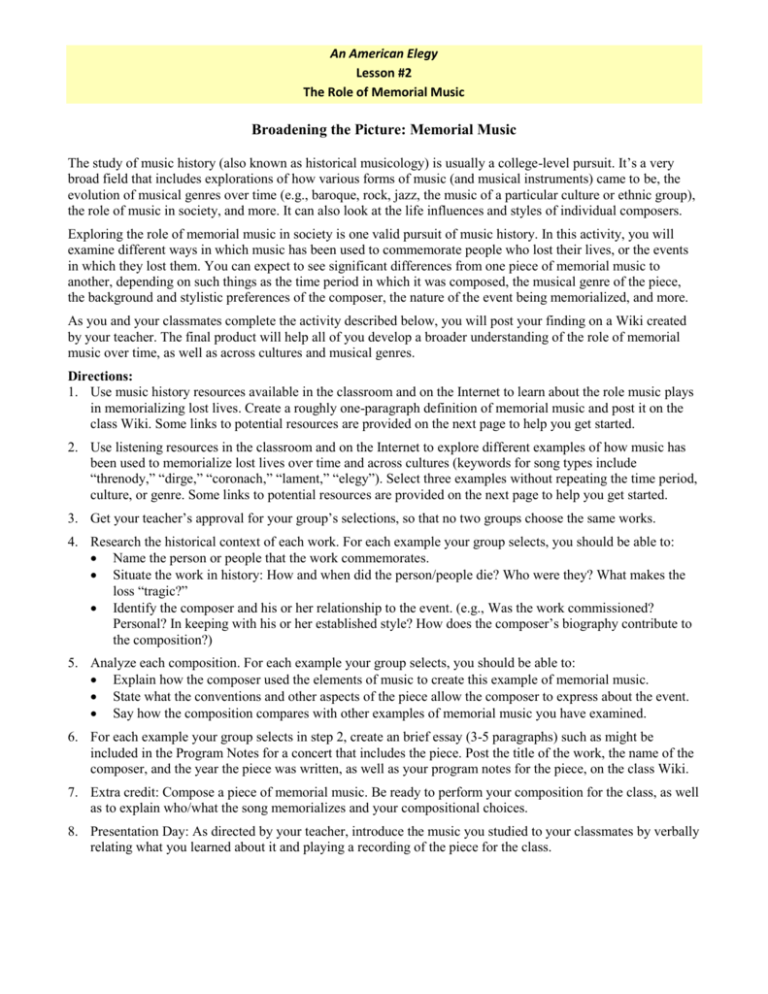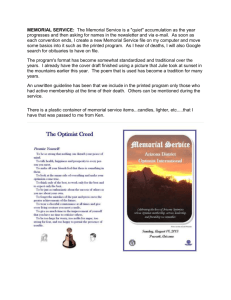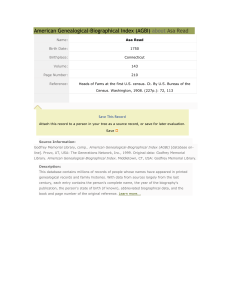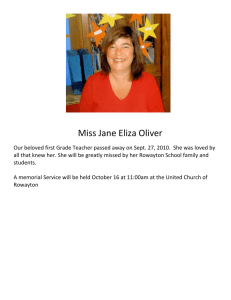Broadening the Picture: Memorial Music
advertisement

An American Elegy Lesson #2 The Role of Memorial Music Broadening the Picture: Memorial Music The study of music history (also known as historical musicology) is usually a college-level pursuit. It’s a very broad field that includes explorations of how various forms of music (and musical instruments) came to be, the evolution of musical genres over time (e.g., baroque, rock, jazz, the music of a particular culture or ethnic group), the role of music in society, and more. It can also look at the life influences and styles of individual composers. Exploring the role of memorial music in society is one valid pursuit of music history. In this activity, you will examine different ways in which music has been used to commemorate people who lost their lives, or the events in which they lost them. You can expect to see significant differences from one piece of memorial music to another, depending on such things as the time period in which it was composed, the musical genre of the piece, the background and stylistic preferences of the composer, the nature of the event being memorialized, and more. As you and your classmates complete the activity described below, you will post your finding on a Wiki created by your teacher. The final product will help all of you develop a broader understanding of the role of memorial music over time, as well as across cultures and musical genres. Directions: 1. Use music history resources available in the classroom and on the Internet to learn about the role music plays in memorializing lost lives. Create a roughly one-paragraph definition of memorial music and post it on the class Wiki. Some links to potential resources are provided on the next page to help you get started. 2. Use listening resources in the classroom and on the Internet to explore different examples of how music has been used to memorialize lost lives over time and across cultures (keywords for song types include “threnody,” “dirge,” “coronach,” “lament,” “elegy”). Select three examples without repeating the time period, culture, or genre. Some links to potential resources are provided on the next page to help you get started. 3. Get your teacher’s approval for your group’s selections, so that no two groups choose the same works. 4. Research the historical context of each work. For each example your group selects, you should be able to: Name the person or people that the work commemorates. Situate the work in history: How and when did the person/people die? Who were they? What makes the loss “tragic?” Identify the composer and his or her relationship to the event. (e.g., Was the work commissioned? Personal? In keeping with his or her established style? How does the composer’s biography contribute to the composition?) 5. Analyze each composition. For each example your group selects, you should be able to: Explain how the composer used the elements of music to create this example of memorial music. State what the conventions and other aspects of the piece allow the composer to express about the event. Say how the composition compares with other examples of memorial music you have examined. 6. For each example your group selects in step 2, create an brief essay (3-5 paragraphs) such as might be included in the Program Notes for a concert that includes the piece. Post the title of the work, the name of the composer, and the year the piece was written, as well as your program notes for the piece, on the class Wiki. 7. Extra credit: Compose a piece of memorial music. Be ready to perform your composition for the class, as well as to explain who/what the song memorializes and your compositional choices. 8. Presentation Day: As directed by your teacher, introduce the music you studied to your classmates by verbally relating what you learned about it and playing a recording of the piece for the class. An American Elegy Lesson #2 The Role of Memorial Music Potential Resources to Get You Started What Is Memorial Music? See Chapter 13: Condolences and Commemoration in the book, Music! It’s Role and Importance in Our Lives (Glencoe). Also see the Web links available on the publisher’s website: http://highered.mcgraw-hill.com/sites/0078297567/student_view0/chapter13/web_links.html Some (but not all) patriotic music memorializes our collective losses and accomplishments as a nation, such as those resulting from wars. See Chapter 12: Ceremony and Celebration in the book, Music! It’s Role and Importance in Our Lives (Glencoe). Also see the Web links available on the publisher’s website: http://highered.mcgraw-hill.com/sites/0078297567/student_view0/chapter12/web_links.html Example: Taps, a military trumpet call, adapted by Daniel Adams Butterfield: http://www.west-point.org/taps/Taps.html http://www.tapsbugler.com/TapsPDFandsound.html Example: Decoration Day by Charles Ives: http://www.musicweb-international.com/Ives/WK_Sym_Holidays.htm http://www.charlesives.org/03catorch.htm Some Examples of Memorial Music If you are interested in World War II, consider: A Survivor from Warsaw for Narrator, Men's Chorus and Orchestra by Arnold Schönberg. Visit the Arnold Schönberg Center website to listen to the piece and learn about the composer. http://www.schoenberg.at/index.php?lang=en Symphony No. 1 (In Memoriam Dresden - 1945) by Dan Bukvich http://www.bukvichmusic.com/comp/symphonyno1/index.php If you are interested in jazz, consider: I Remember Clifford, by tenor saxophonist Benny Golson in memory of trumpeter Clifford Brown Threnody, by Marian McPartland in memory of pianist Mary Lou Williams Strange Fruit by Abel Meeropol (pen name Lewis Allan) in memory of the 1930 lynching of two Black men Goodbye Pork Pie Hat, by Charles Mingus in memory of Lester Young If you are interested in classical music, consider: Nanking! Nanking! by Bright Sheng, a threnody about China’s Nanking massacre Cantus in Memory of Benjamin Britten by Arvo Pärt Memorium by W. Cummings (http://www.jwpepper.com/2349454.item) Pastoral Nocturne by retired NJ band director Bruce Yurko, commissioned in memory of Sterling High School student Jennifer Persia (http://test.allmusic.com/cg/amg.dll?p=amg&sql=43:104864) If you are interested in popular music, consider: American Pie by Don McLean in memory of musicians Buddy Holly, Ritchie Valens and The Big Bopper (Jiles Perry Richardson, Jr.). Elegia by New Order in memory of fellow musician Ian Curtis Candle in the Wind by Elton John in memory of Marilyn Monroe, later adapted for Princess Diana Tears in Heaven by Eric Clapton in memory of his son Threnody for Souls in Torment by Robert Fripp of King Crimson in memory of the Holocaust Sunday Bloody Sunday by U2 in memory of civil rights marchers who were shot in Northern Ireland If you are interested in non-Western music and influences, consider: Threnody for Carlos Chavez by Lou Harrison Loch Lomond (18th-century Scottish folksong) An American Elegy Lesson #2 The Role of Memorial Music Balinese Cremation Ritual Music



